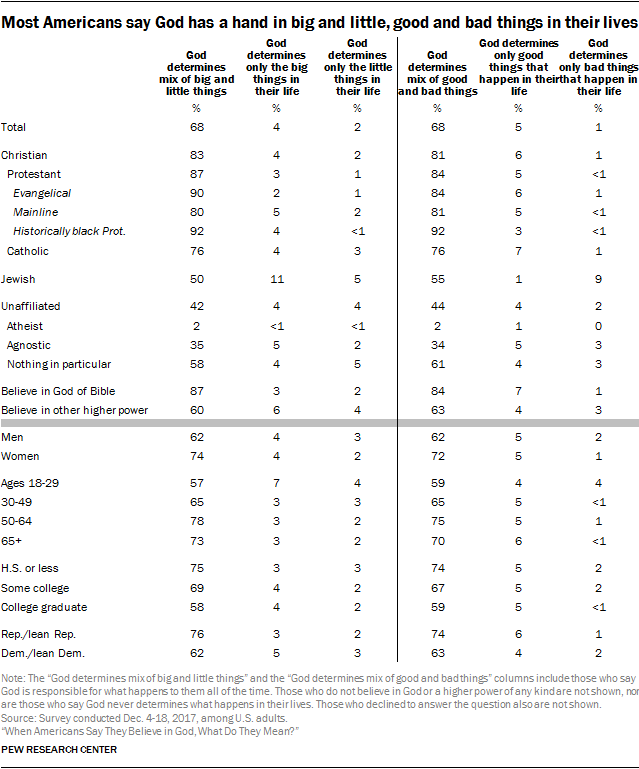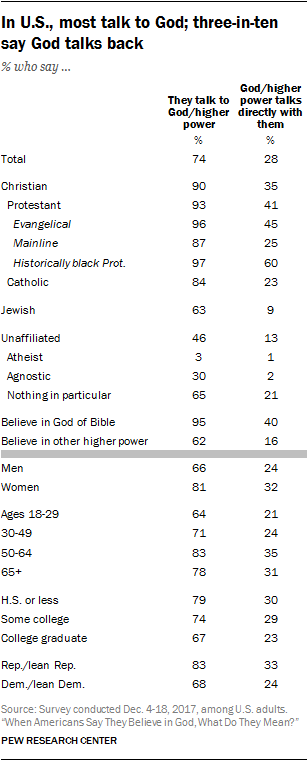
About three-quarters of Americans say they try to talk to God or another higher power. And 28% indicate that their attempts at communication are answered, saying God or the spiritual force in the universe talks directly with them.
Communicating with God is most common among evangelical Protestants and those in the historically black Protestant tradition, with nearly everyone in both groups saying they talk to God. Six-in-ten people in the historically black Protestant tradition say this communication is a two-way street and that God talks directly with them; 45% of evangelicals say the same.
Compared with Christians, fewer Jews (63%) say they communicate with God, and just one-in-ten U.S. Jews (9%) say God talks to them. Even fewer religious “nones” (46%) say they speak to God or a higher power they believe in, but among the subset of “nones” who describe their religion as “nothing in particular,” two-thirds (65%) say they do indeed try to talk to the deity – and roughly one-in-five say God talks back.
As with so many other measures of belief and engagement with the divine, women are more likely than men to say they communicate with God, and those over 50 are more likely than younger adults to say this. Talking to God is less common among college graduates than among those with less education.
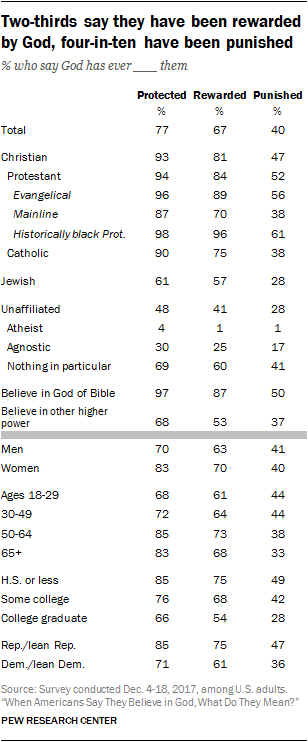
When asked whether they have ever been protected by God, three-quarters of Americans (including 93% of Christians) say yes. And two-thirds of U.S. adults (including about eight-in-ten Christians) say they have been rewarded by God at some point in their lives. Far fewer people – just four-in-ten U.S. adults and 47% of Christians – say there has been a time when they were punished by God.
Overwhelming majorities of all Christian traditions say they have been protected by God. Similarly, the share of Christians who say they have been rewarded by God ranges from 70% among mainline Protestants to 96% among those in the historically black Protestant tradition. By contrast, those in the historically black Protestant tradition (61%) and evangelicals (56%) are the only Christian subgroups in which more than half of respondents say they have been punished by God.
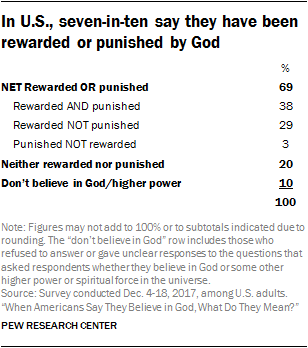
Analysis of the survey data reveals that those who believe they have been rewarded by God are divided between those who have been rewarded and punished (38% of all adults) and those who believe they have been rewarded but not punished (29%). Very few Americans say they have been punished by God without also having been rewarded (3%).
This relative optimism about God’s involvement in life is consistent with previous studies that have shown, for example, that the share of Americans who believe in heaven is significantly larger than the share who believe in hell.
Half of U.S. adults think God determines what happens in their lives “all” or “most” of the time, including 27% who say God always determines what happens to them and 21% who say God is behind most of what happens to them. One-in-five (18%) say God determines what happens to them “some” of the time, and 23% say God hardly ever or never determines the course of their life. (An additional 10% do not believe in God or a higher power.)
The belief that God is responsible for all or most things that happen in life peaks at 82% among those in the historically black Protestant tradition, and this view is shared by 72% of evangelical Protestants. More than half of Catholics (56%) also see God’s hand at work in all or most things that happen to them, as do 53% of mainline Protestants.
Among demographic groups, more women than men see God at work in all or most of what happens in their lives. There is also a big gap between college graduates and those with less education. Among adults who have a high school degree or less education, a majority (59%) believe God is largely or entirely responsible for what happens to them; roughly a quarter believe God hardly ever or never determines the course of their lives (17%) or reject belief in a higher power altogether (6%). By contrast, among college graduates, nearly half say God determines little or nothing of what happens to them (29%) or doesn’t exist at all (16%), while only one-third see all or most of what happens to them as God’s handiwork.
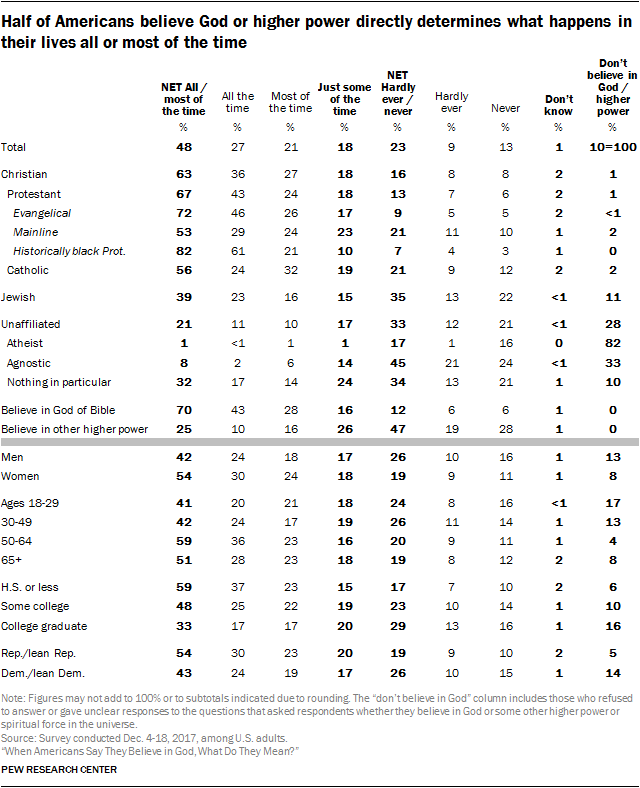
Respondents who indicated that God determines what happens in their lives occasionally (i.e., at least “hardly ever” but not “all the time”) were asked whether God determines only the big things in life or the little things (or both), and were separately asked whether God determines only the good things, only the bad things, or both.
The survey shows that most people think God or another higher power in the universe is at work in both the big and little things in life, and in the good things as well as the bad. For instance, two-thirds of Americans believe God is behind at least some of the big things and some of the little things in life; this group includes those who say God is responsible for everything that happens to them, as well as those who think God is sometimes responsible for both big and little things that happen to them. Very few people say God is responsible for only the big things (4%) or only the little things (2%) in life. (Others say God does not determine anything that happens in their life, or does not exist.)
Similarly, just 5% say God is responsible for only the good things that happen to them, and 1% say God is behind only the bad events in life. Most adults see God’s hand at work in both positive and negative things.
